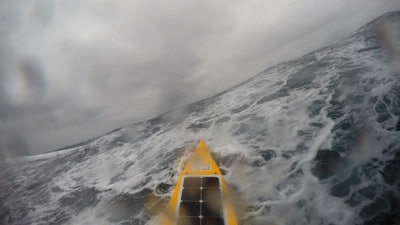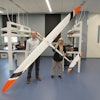
The CaPASOS (Calibrated pC02 in Air and Surface Ocean Sensor), created by the University of Exeter and the National Oceanography Centre, will be carried on unmanned robotic boats to locations including the Southern Ocean.
Ship-borne sensors gather data in many parts of the world, but hostile conditions in some oceans - especially in winter - mean few ships go there.
Exeter's part of the project has been awarded £521,000 in grants, including £425,000 from the Natural Environment Research Council, announced last week.
"Climate change is largely being driven by burning fossils fuels, but only about half of the carbon dioxide released ends up in the atmosphere," said Professor Andrew Watson, from the University of Exeter.
"The other half is being absorbed, it is believed, in approximately equal amounts by 'carbon sinks' - vegetation on land and uptake by the ocean.
"The ocean uptake slows climate change - which is of great value and is the focus of intense research - but that process also causes ocean acidification.
"While carbon dioxide levels in some parts of the oceans are well monitored, there are other very large regions - the Indian, South Pacific and Southern oceans, for example - where we have woefully insufficient data.
"There are almost no data for the Southern Ocean in winter, and this is a region we think is particularly important for carbon dioxide uptake."
The CaPASOS instrument will measure partial pressure of carbon dioxide (pC02) in the air and surface of the ocean, both of which are vital to calculating how C02 moves between the air and sea.
It will be carried on unmanned, remotely piloted vessels - several of which are already being used by the National Oceanography Centre.
"The technical challenge is to adapt the successful principles of the instruments mounted in ships or large buoys, where space and power are not limiting factors, to achieve the same high accuracy with small space and power footprint, long endurance and resistance to violent motion - all of which will be needed on an unmanned vessel," Professor Watson said.
"We will achieve this by bringing together the extensive experience that the University of Exeter group has in operating ship-based CO2 systems over 20 years, with improvements in engineering, utilising the experience and expertise of the National Oceanography Centre's Technology and Engineering groups."
The Exeter team working on the project includes Professor Watson, Mike Boniface, Dr Ute Schuster, Dr Witek Tatkiewicz and Jessica Thorn.






















